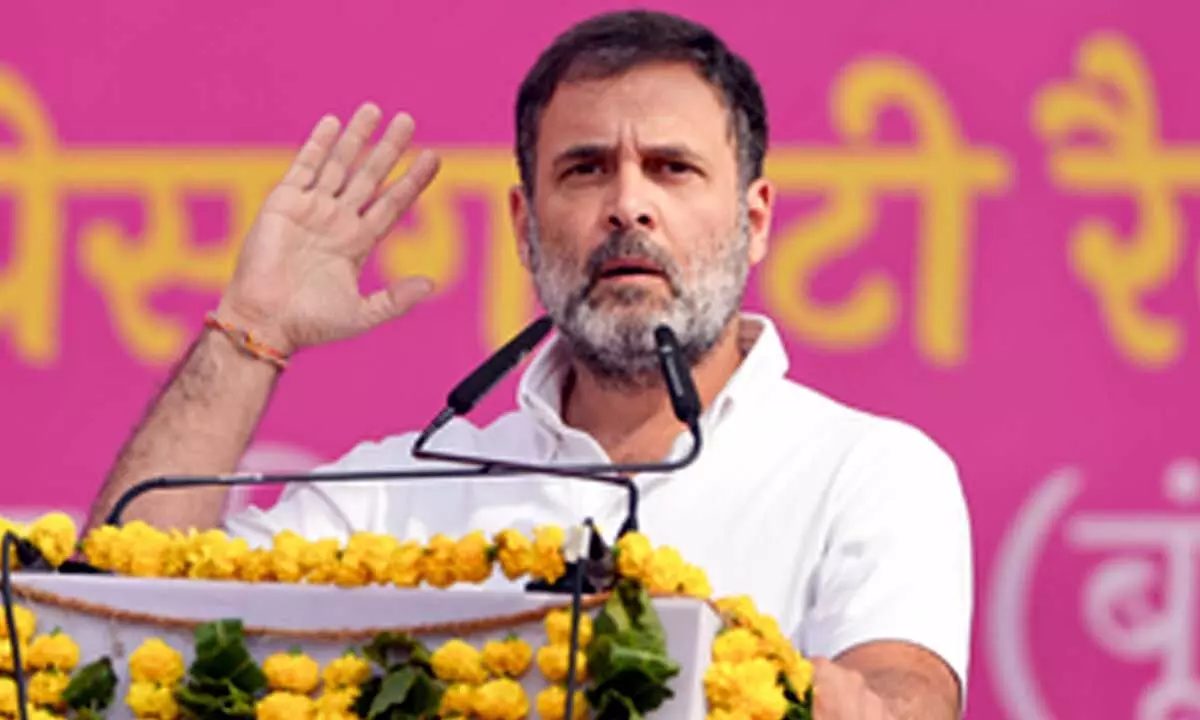Rahul’s 'revolutionary' idea may hit Cong hard

Rahul Gandhi
It was a moment of distress for 79-year-old Rajni Dhar when the cacophony over the inheritance tax during a news show took her back several decades to the painful memories of her birthplace, Kashmir.
It was a moment of distress for 79-year-old Rajni Dhar when the cacophony over the inheritance tax during a news show took her back several decades to the painful memories of her birthplace, Kashmir. Her family and many others from the Hindu community were significantly affected by the ‘Land to Tiller Law’, meticulously enacted in 1950 by then J&K Prime Minister Sheikh Abdullah.
The law restricted the ownership of landlords, and extra land was taken over by the state and given to tillers. The latter did not pay any compensation for the land received. The Hindu landlords were especially targeted in both Jammu and Kashmir, rendering them economically weaker. Now in 2024, the buzz about Congress promising to take away all that ‘extra’ wealth of a section of the population brought back memories of the pain that Dhar and many others had to endure.
Kamlesh, a 47-year-old house help, whose family resides in a dwelling built with government funds in her village in Uttar Pradesh’s Moradabad district, is confused today. After hearing about the Congress’ wealth distribution plan, she feared that her family might lose the new house as the joint family had an ancestral dwelling in the same village. She is also apprehensive since her family is worried about talks regarding the reservation rights for Backwards being snatched away and given to the Muslims by Congress.
These fears have become a topic of discussion among the general populace. The fact that Congress has a history of doing such things has made people take Rahul Gandhi’s statement critically this time.
In 1953, then Prime Minister Jawaharlal Nehru’s government brought the inheritance tax under the Estate Duty Act as it found that there were inequalities in wealth. The Act, also known as ‘Death Tax’ was imposed on the principal value of movable and immovable property, including agricultural land, which a person inherited after the death of the owner of the property. The Act was abolished in 1985 by the Rajiv Gandhi government when he became Prime Minister after the death of Indira Gandhi. The BJP has accused that he did so to escape from the said tax on Inheritance.
With this piece of history being resurrected, people feel that this is Rahul Gandhi’s plan for a new ‘INDIA’.
What has given credence to this is the statement by Sam Pitroda, a close aide of the Gandhi family and Chairman of the Indian Overseas Congress, who highlighted the importance of wealth redistribution policies, citing the US laws. Though the Congress later distanced itself from Pitroda’s comments, the cat is already out of the bag.
Rahul’s pledge to pursue ‘jitni abadi utna haq’ and his X-ray plan to detect peoples’ wealth have set the middle-class thinking. Amit is an IT professional in Delhi, who bought an apartment on EMI. Recently his loan ended and he got the ownership paper from the bank. Rahul Gandhi’s wealth distribution plan has worried him as now he owns the flat and has also inherited property from his late father. There are millions of Amit-like stories in the middle class.
The voices may or may not reflect the sentiment of the whole nation, but hint at the churn that has started, especially among the middle class. They work hard, take loans to build new nests and create assets after paying taxes.
It is not just the lands and houses; the fear is also about Rahul Gandhi’s Congress/INDIA bloc government – if voted to power – sneaking into the lockers and cabinets of millions of women who keep their valuable ‘stree dhan’ hidden away. It is also about the attack on the tradition of hidden savings done by women in all households. Women in India are highly sensitive and emotive about stree dhan and their hidden treasures in the lockers. These are things passed on from generation to generation. But Rahul Gandhi seems to have other plans for this ‘hidden’ wealth.
What he wants the Congress to do is what is at the core of Communist philosophy, which believes in redistribution of wealth. Communists all over the world have failed in their deeds. The crumbling of the erstwhile Soviet Union is the best example of this failure. China, another communist power, was forced to adopt changes and has space for private capital. The East European bloc, too, has suffered immensely. But in 2024, Rahul Gandhi wants to pick up from the Communist Manifesto, a political pamphlet written by Karl Marx and Friedrich Engels in 1848.
While releasing the party's election manifesto at a public meeting in Tukkuguda in Telangana on April 6, he stressed: "Jitni aabadi, utna haq". He said: "First, we will conduct a caste census to know the exact population and status of backward castes, SCs, STs, minorities. After that, the financial and institutional survey will begin. Then, we will take up the historic assignment to distribute the wealth, create jobs.”
The Congress party’s manifesto and Rahul Gandhi’s plan to map everyone's assets and then equally divide them have provided vital ammunition to the BJP. The BJP has called it divisive and a reflection of the Congress’ appeasement politics.
The Congress may believe that inheritance, redistribution, and reservation could be its three mantras for progression. But, at the moment and as the election progresses, the grand old party seems to be only widening its gap from the masses. People like Rajni Dhar, Kamlesh, and Amit are not just a few individuals but reflect a growing sentiment.








